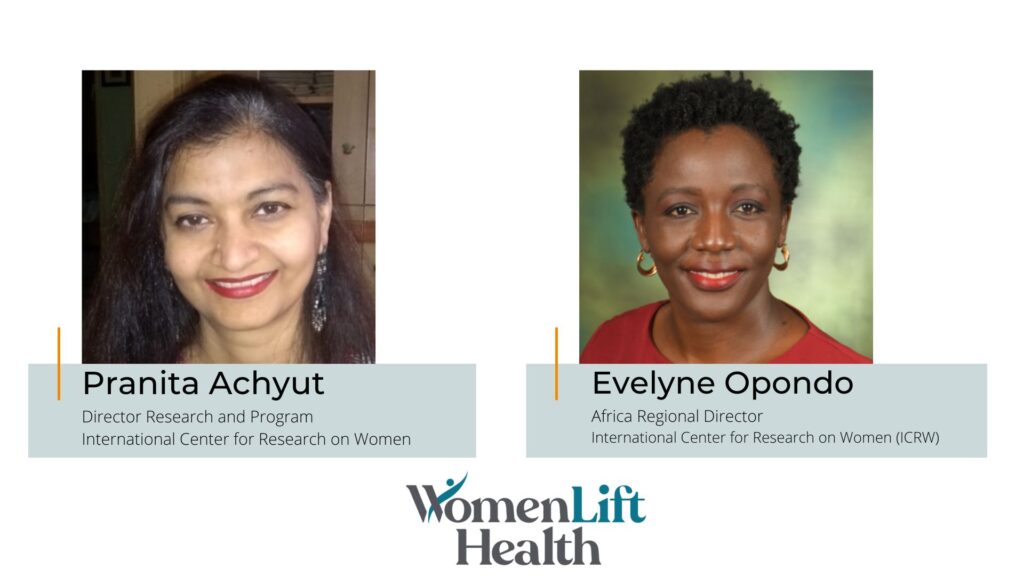While women make up approximately 67% of global employment in the health and care sector, they are paid approximately 20% less than men according to a report co-developed by the World Health Organization (WHO) and International Labour Organization (ILO). This wage gap has little to do with differences in the characteristics and endowments of women and men, the report posits, making it ever more critical that governments, academia, civil society and individuals listen up and start to more fairly value women in healthcare’s contributions. Promoting training and equal opportunity to ensure upward mobility and reduce gender segregation is but one of the key policy considerations proposed for narrowing the gender wage gap.
WomenLift Health’s signature program is the Leadership Journey, a 12-month learning experience focused on giving mid-to-senior level women in health the safe space, tools, frameworks, and support of peers, mentors, and coaches, to broaden their mindset, deepen their leadership, own their expertise, and amplify their voice and impact.
What makes the WomenLift Health Leadership Journey truly unique is that it is built upon relationships. Women leaders in each hub (East Africa, South Asia, North America, with South Africa coming soon) are supported by comprehensive regional support network, their peers, mentors, and coaches, and then join regional and global alumnae communities. The relationships women build with their cohort peers have extended well beyond the Leadership Journey and support them throughout their careers.
We recently spoke with Pranita Achyut and Evelyne Opondo, part of the Leadership Journey cohorts in India and East Africa respectively, to share their own experiences as women in health and hear their reflections on the gender disparities they see.

Are you optimistic that change will come regarding the gender pay gap? What do you think needs to be done to provide equal opportunities for women in the health and care sector?
Pranita Achyut, Leadership Journey India 2022:
I am optimistic that change will come. It’s important to identify the gaps. First, there is limited recognition of the issue of underrepresentation, skewed pay parity and other discrimination at place of work. This requires accessible evidence on the status, causes and consequences for wider recognition and discourse. Then, there is a need for clear organizational policies regulated by the State through laws and policies. I feel women leaders have a bigger role and responsibility to challenge the status quo.
Evelyne Opondo, Leadership Journey East Africa 2022:
I am hopeful that change will come one day, but we still have a long way to go. The global economy depends on the unpaid and underpaid care work primarily carried out by women governments should treat care work like a collective good, expanding its availability and providing adequate support to those who do it. We can make laws and policies that recognise the care burden that women bear.
Flexible work arrangements help women to juggle their many responsibilities and to achieve a better work-life balance. We need to also ensure that women have an equal place in health leadership by building the legal and policy foundations for equality, addressing the social norms and stereotypes that drive gendered segregation in the health workforce and places lower value on professions that are majority female and also by addressing workplace systems and organizational cultures that typically exclude women.
How did you first get involved in the health field?
Pranita: It was incidental. After completing my Master in Population Studies from IIPS, I joined a research organization. Coming from statistics and population studies background, I was given responsibility to lead primary research activities on childhood immunization and diarrhea. That journey became intense during my tenure at UNICEF and ICRW.
Evelyne: I am a lawyer by profession. I got interested in the health field particularly the interaction of health and human rights because of the many clients I represented in court and the policies and legislative reforms I advocated for because of the suffering and indignity of women and girls that I witnessed while I worked at the Federation of Women Lawyers (FIDA) Kenya. A lot of these had to do with sexual, reproductive health and rights ranging from women and girls who had been raped, denied abortion care and ended up with severe post abortion complications after unsafe abortions and many who died in the process, HIV based discriminations such as forced sterilisation and denial of services, disrespectful and inhumane treatment during child birth, a health care system that lacked basic supplies for quality health care services…. the list was endless. This was compounded by a general lack of awareness of the lived reality of women and girls, stigma around SRHR issues especially abortion and a generally hostile legal and policy environment. This was in the early 2000. I, together with Elisa Slattery, the Legal Adviser at The Center for Reproductive Rights, conceptualised a ground-breaking study which looked at the violations that women suffer in their attempt to access SRHR services in Kenya. The report titled Failure to Deliver had such shocking revelations. I knew then that this was the area I wanted to work on and although it would be a tough environment, we needed more SRHR advocates as we were too few then.
What were some of the challenges you faced, particularly as a woman, and how did you deal with them? Did the nature of these challenges change as you moved up the ladder into leadership positions?
Pranita: Challenges are part of the career journey, just the nature changes over time. During early years of career, engagement with senior officials within UNICEF and Govt. was challenging. They were not willing to give space, and I had to prove my ability time and again to get space on the table and their attention, despite the advantages of being from UNICEF. My approach was to recognize and accept this as a challenge; discussed and sought support from my supervisor and peers; and continue to strengthen my technical and communication skills. As I moved up in my career, nature of my engagement changed. From a ‘doer’, I had to move to a ’manager’. That was also challenging. Another challenge is my inability to join late evening events. These events provide excellent opportunities to connect and network, and I feel I lose out on this.
Evelyne: As an advocate for reproductive rights and especially safe and legal abortion which I know is an area that is a target of such organized opposition, I am aware that there are people whose work is solely to oppose bodily autonomy especially for women. But we have made so much progress over the years. We have not only seen improved standards at the Africa regional level with the African Protocol on the Rights of Women being the only treaty that explicitly provides for abortion as a right, but also, several African countries have made good progress with their policy legislative frameworks to respond to the needs of women. In the early 2000 it was easier to target those of us who worked around abortion and issue all manner of threats to us. To date, we are quite a number, and the movement is growing. I am particularly excited about the number of bold SRHR advocates that have considerably grown over the years and especially the fearless youths at the forefront of change and who are challenging stereotypes.
What has been the greatest enabler and biggest barrier in your career to date?
Pranita: It’s hard to pinpoint one thing, rather multiple factors contributed in my career growth. My own strength, abilities – being proactive, eye for detailing, ready to take on challenging assignments; supportive family, team and supervisor; organization culture, which is open, provides space to take decision and be accountable, provides opportunities to learn and thrive. Biggest barrier is undermining my own abilities (being underconfident), often shaped by people around and internalized. Also, I am a content person.
Evelyne: At the beginning of my career, I did not understand the value of a network or even who my professional network really was. My biggest enabler in my career to date has been my network. I have learnt that your network is your net worth and your network determines how far you get to go in your career. My biggest barrier has been poor self-awareness. Now I am investing time in understanding who I am, what I want from life, what I want to give to the world and how I communicate this. Importantly also, what are my strengths and blind spots are and how I complement or compensate for them.
Who was/is your role model/mentor?
Pranita: Many people – Dr. K. Suresh (my supervisor at UNICEF), Ravi Verma (current supervisor at ICRW), Nandita Bhatla (ex-colleague) and several others have mentored me and contributed significantly in my growth. I don’t have a role model, but several women leaders have inspired me over the years. Geeta Rao Gupta and Kamla Bhasin are two such inspiring personalities.
Evelyne: I have always admired Winnie Byanyima, the UNAIDS Executive Director. She is well-read and intellectually nimble. I like her versatility, brilliance, and humility. I celebrate our African ladies who are excelling at the global stage because it’s not an easy space. Lately, I am also quite intrigued by Mia Mottley, the Prime Minister of Barbados. She has an executive presence and just always stands out. The Time magazine describes her as Bold, fearless, and possessing a great intellect and wit and I completely agree. She has guts and speaks truth to power.
What made you decide to join the first cohort of WomenLift Health’s Leadership Journey (in India/East Africa)?
Pranita: For me, the big pulls were being part of the first leadership cohort, connect with wonderful current and future leaders, gain leadership skills, and contribute to others’ development and growth.
Evelyne: Everybody who is interested in leadership should take a leadership course at some point. When I applied for the journey, I was interested in working with a group who would help me bring out the leader that I want to be. It has been a journey of a lot of self-introspection and working with experts who have helped me to grow. I have also expanded my network and I am now connected to these wonderful ladies with common area of interest in health and with a commitment to support and cheer each other as we learn from one another. I also really liked the fact that this is a global movement of women in health leadership and we are also connecting at the global level with other cohorts. It is a great learning platform.
What would you say to emerging women leaders in health?
Pranita: Believe in your strength, connect and collaborate with other leaders, grow, and contribute to others’ growth. Carve out your own journey building on your values and aspirations.
Evelyne: Women make great leaders so do not fear to put yourself out there. Men take up opportunities even when they do not know what they are doing so do not wait until you have 100% knowledge of the job requirements. Take the opportunity when it shows up and be committed to learning on the job and receiving support and mentorship from those in the field or with the know-how.


